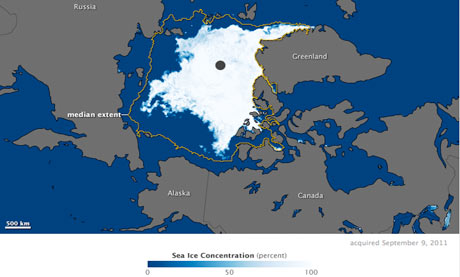Global Warming: Melting Arctic Ice Opens New Shipping Routes

September 2011 saw ice levels in the Arctic Sea drop to the second-lowest extent on record, according to data released by NASA and the National Snow and Ice Data Center at the University of Colorado in Boulder.
The image above shows that the summertime sea ice-cover also scarcely avoided a new record low; the current record was set in 2007.
The Arctic ice cap reduces each summer as the sun appears higher in the sky in the Earth's northern region, reaching its annual minimum extent in September.
This year's record low has concerned scientists as the unusual weather conditions attributed to the 2007 record were not evident in July and August.
"Atmospheric and oceanic conditions were not as conducive to ice loss this year, but the melt still neared 2007 levels," said Matt Meier of NSIDC.
"This probably reflects loss of multi-year ice in the Beaufort and Chukchi seas, as well as other factors that are making the ice more vulnerable."
Since 1979, September's Artic sea ice extent has declined by 12 percent per decade, according to Science Daily. The low sea ice level for 2011 fits into this general pattern, said Joseph Comiso of NASA's Goddard Space Flight Center.
"The sea ice is not only declining; the pace of the decline is becoming more drastic," he noted. "The older, thicker ice is declining faster than the rest, making for a more vulnerable perennial ice cover."
The rapid climate change could be good news for the world's shipping companies, as sea ice decreased enough to open up both the Northwest Passage and the Northern Sea route for brief periods in September.
Several companies reported significant savings by completing voyages through the new routes this summer, with Danish shipping company Nordic Bulk Carriers claiming to have saved a third on its usual costs and nearly half the time shipping goods to China via the Arctic.
"We saved 1,000 tons of bunker fuel - nearly 3,000 tons of CO2 - on one journey between Murmansk [Russia] and north China," Christian Bonfils, a director of Nordic Bulk Carriers, told the Guardian.
"The window for sailing the route is four months now, but the Russians say it is seven. When we can save 22 days on transportation, it is very good business for us," he added.
© Copyright IBTimes 2024. All rights reserved.






